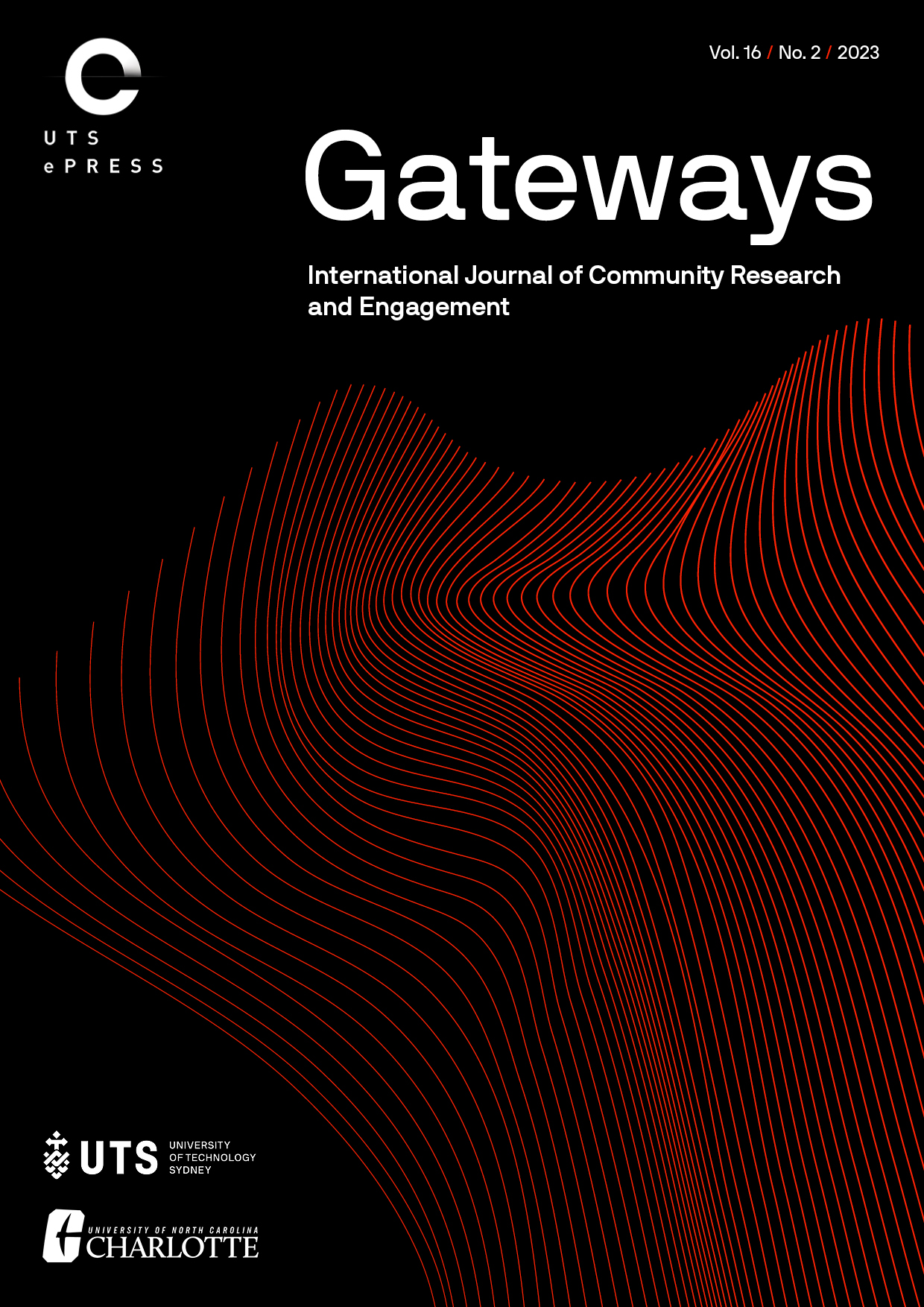Faith-based community-academic partnerships: An asset-based community development strategy for social change
Main Article Content
Abstract
Faith-based community anchor institutions are important collaborators in community development. They are respected social innovators who deploy their assets for the common good, especially good works aimed towards helping marginalised communities and those in poverty. More recently, the pace of faith-based social innovation and community development leadership has slowed substantially (Jones 2016). Seeking renewed imagination, will and ability for asset-based social innovation among faith-based communities, the Ormond Center at Duke University’s Divinity School has developed a curriculum, based on a human ecology framework, that engages faith-based ‘community- academic partnered participatory research’ (Chen et. al. 2006) towards social change.
Our approach starts by working with congregations to discover community-level barriers to thriving in their local context. We then walk alongside faith-based communities to identify strengths-based, relationship-centred opportunities to collaboratively integrate congregational assets with community assets towards positive social change. This curriculum has been tested by the Ormond Center with several diverse, multi- denominational congregations in communities located in North Carolina and Virginia. Its potential to encourage asset-based community development for social good is supported by tangible evidence. This article takes the reader through the process of changing a semester-long graduate course, designed by the academy for the academy, to a six-week course that walks alongside faith- based lay leaders and pastors in their local context, towards asset-based community development for positive social change. Five viable asset-based solutions to community-level social issues are shared, and lessons learned are offered.
Article Details
Issue
Section
Authors who submit articles to this journal from 31st March 2014 for publication, agree to the following terms:
a) Authors retain copyright and grant the journal right of first publication with the work simultaneously licensed under a Creative Commons Attribution License that allows others to share and adapt the work with an acknowledgement of the work's authorship and initial publication in this journal.
b) Authors are able to enter into separate, additional contractual arrangements for the non-exclusive distribution of the journal's published version of the work (e.g., post it to an institutional repository or publish it in a book), with an acknowledgement of its initial publication in this journal.
c) Authors are permitted and encouraged to post their work online (e.g., in institutional repositories or on their website) prior to and during the submission process, as it can lead to productive exchanges, as well as earlier and greater citation of published work (See The Open Access Citation Advantage Service). Where authors include such a work in an institutional repository or on their website (ie. a copy of a work which has been published in a UTS ePRESS journal, or a pre-print or post-print version of that work), we request that they include a statement that acknowledges the UTS ePRESS publication including the name of the journal, the volume number and a web-link to the journal item.
d) Authors should be aware that the Creative Commons Attribution (CC-BY) License permits readers to share (copy and redistribute the work in any medium or format) and adapt (remix, transform, and build upon the work) for any purpose, even commercially, provided they also give appropriate credit to the work, provide a link to the license, and indicate if changes were made. They may do these things in any reasonable manner, but not in any way that suggests you or your publisher endorses their use.
For Volume 6 (2013) and before, the following copyright applied:
Articles published by UTSePress are protected by copyright which is retained by the authors who assert their moral rights. Authors control translation and reproduction rights to their works published by UTSePress. UTSePress publications are copyright and all rights are reserved worldwide. Downloads of specific portions of them are permitted for personal use only, not for commercial use or resale. Permissions to reprint or use any materials should be directed to UTSePress.
References
Chen, D, Jones, L, Gelberg, L 2006, “Ethics of Clinical Research within a Community-Academic Partnered Participatory Framework,” Ethnicity & Disease, vol. 16, Supplement 1: The Community Health Improvement Collaborative: Building Community-Academic Partnerships to Reduce Disparities, pp. 118-135. https://www.jstor.org/stable/48666978
Community Craft Collaborative 2023, The Ormond Center Website, viewed 14 June 2023, https://ormondcenter.com/join-the-collaborative.
DurhamCares 2017 DurhamCares Website, viewed 14 June 2023, https://durhamcares.org/what-is-christian-community-development/.
Jacobs, J 2011, “The Kind of Problem a City Is,” The Death and Life of Great American Cities, Modern Library, New York, pp. 558-586.
Jones, L 2016 Christian Social Innovation: Renewing Wesleyan Witness, Abingdon Press, Nashville, TN, p. 5.
King, M 1963, “Love in Action,” Strength to Love, Fortress Press, Philadelphia, pp. 39-48.
Minkler, M, Wallerstein, N 2008, Community-Based Participatory Research for Health, 2nd edn, Jossey-Bass, San Francisco, CA, pp. 1–23.
Noel, L, Phillips, F, Tossas-Milligan, K, Spear, K, Vanderford, N, Winn, R, Vanderpool, R, Eckhardt, S, 2019, “Community-Academic Partnership: Approaches to Engagement,” American Society of Clinical Oncology Educational Book, vol. 39, 88-95. 10.1200/EDBK_246229
Pressing Our Way Through COVID-19 2021, Duke University Site, viewed 14 June 2023, https://sites.duke.edu/pressingourway/.
Steiner, F 2008 “Human Ecology: Overview,” in Encyclopedia of Ecology, Academic Press, Cambridge, MA, pp. 1898-1906.
The Human Ecology, The Thriving Cities Group Site, viewed 14 June 2023, https://thrivingcitiesgroup.com/our-framework.
Tulchinsky, T, Varavikova, E, Cohen M 2023, “Chapter 2 - Expanding the Concept of Public Health,” in The New Public Health, 4th edn, Academic Press, Cambridge, MA, pp. 55-123.
Wright, K, Williams, P, Wright, S, Lieber, E, Carrasco, S, Gedjeyan, H 2011, “Ties That Bind: Creating and Sustaining Community-Academic Partnerships,” Gateways: International Journal of Community Research and Engagement, vol. 4, pp. 83–99.
http://dx.doi.org/10.5130/ijcre.v4i0.1784
Yates, J 2017, “The City, the Good Society, and Human Flourishing,” presented at the 2017 Yale Values and Human Flourishing Conference, Yale University, New Haven, CT, 26 March.
